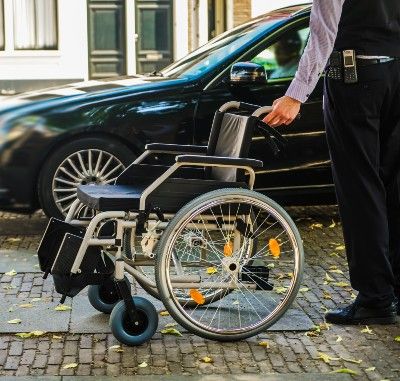Top Class Actions’s website and social media posts use affiliate links. If you make a purchase using such links, we may receive a commission, but it will not result in any additional charges to you. Please review our Affiliate Link Disclosure for more information.
A class action lawsuit alleging the lack of Lyft wheelchair accessibility violates federal law has survived a motion to dismiss.
U.S. District Court Judge William Alsup ruled on competing motions for summary judgment submitted by the plaintiffs, a group of people with disabilities and disability advocacy organizations and Lyft. While Lyft’s motion to dump the claims entirely was denied, the plaintiffs will still need to support their claim that Lyft failed to make reasonable accommodations for people with disabilities.
Lyft App Accused of ADA Violations
The Lyft wheelchair accessibility class action lawsuit was filed in March 2019. In their complaint, disability advocates claimed the ride-hailing app failed to provide sufficient services to those with mobility disabilities. The plaintiffs alleged that Lyft’s policies and procedures violated the Americans with Disabilities Act (ADA) as a result.
According to the complaint, Lyft failed to provide enough wheelchair accessible vehicles (WAVs) in the San Francisco Bay Area. The class action lawsuit argues that Lyft needs to change its policies and procedures to offer an adequate number of WAVs in the area — for example, by offering incentives to WAV drivers.
Lyft Argues for Dismissal
The ride-hailing service filed a motion to dismiss the class action lawsuit, arguing the demand for WAVs is minimal and the cost to provide accessible services in the Bay Area would be exorbitant. Lyft also contended the ADA does not require the ride-hailing company to buy WAVs, likening it to a bookstore required to provide all books in Braille.
The company pointed to data from areas where Lyft is required to offer WAVs due to regulations or because it partners with local transit authorities.
It claimed in its motion that requests for WAVs are less than 1% in these markets. The company contended that if it was required to offer WAVs at the rate demanded by the class action lawsuit, individuals with disabilities would need to take more than two Lyft rides every single day.
California Judge Dumps Dismissal
Judge Alsup of the Northern District of California rejected Lyft’s arguments to dismiss the claim, pointing out that the issue is whether Lyft’s current policies, practices or procedures violate the ADA.
“Lyft correctly contends that Congress, when passing the ADA, did not seek to burden private entities by requiring them to acquire WAVs,” the order states. “And this provision does apply and exempts entities like Lyft from having to purchase or lease vehicles with a seating capacity of less than eight passengers. But this section does not, however, negate the ADA’s requirement for entities like Lyft to make reasonable modifications to rectify a discriminatory policy, practice, or procedure.”
The judge also noted Lyft itself has figured out how to operate in other locations that require it to provide WAVs, indicating the company’s argument that changing its policies to provide accessible vehicles may not hold water.
“Lyft’s arguments as to the impossibility or burden of some of these modifications go to the reasonableness of the modifications, not their existence. Since plaintiffs have identified policies, practices, or procedures that can be implemented, the key question is whether making these modifications in the Bay Area Counties would be reasonable,” Judge Alsup concluded.
Though the plaintiffs prevailed in continuing with their class action claims, they will still have to establish that proposed modifications are reasonable under the judge’s order denying their bid for summary judgment on that issue.
Judge Alsup noted that proving the reasonableness of proposed modifications to the Lyft app would be the plaintiffs’ burden.
Specifically, the plaintiffs must show the modifications would not “fundamentally alter the nature of such goods, services, facilities, privileges, advantages, or accommodation” in order to establish that Lyft is in violation of the ADA.
Indeed, the judge noted in his order, “just because some cities have implemented local regulations that require certain accommodations such a minimum number of WAVs on the road does not mean that it would be reasonable to apply such rules nationwide.”
Are you a wheelchair user who has had a hard time using the Lyft app? What do you think about the Lyft wheelchair accessibility class action lawsuit claims? Tell us in the comment section below.
Plaintiff and the proposed Class Members are represented by Stuart Seaborn, Melissa Riess and Rebecca Serbin of Disability Rights Advocates.
The Lyft App Class Action Lawsuit is Independent Living Resource Center San Francisco, et al. v. Lyft Inc., et al., Case No. 3:19-cv-01438, in the U.S. District Court for the Northern District of California.
Read About More Class Action Lawsuits & Class Action Settlements:

















One thought on Lyft Wheelchair Accessibility Class Action Lawsuit Dodges Dismissal
Add me